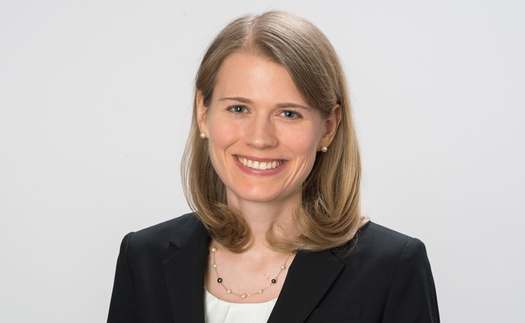 Partner Kathleen Chandler specializes in economic and statistical analyses, discovery support, and leading teams that analyze large, complex data sets. Here she delves into the difference between testifying experts and consulting experts, explains how the data she collects and the analyses she conducts help inform our clients’ strategies, and recounts a particularly memorable deposition she supported.
Partner Kathleen Chandler specializes in economic and statistical analyses, discovery support, and leading teams that analyze large, complex data sets. Here she delves into the difference between testifying experts and consulting experts, explains how the data she collects and the analyses she conducts help inform our clients’ strategies, and recounts a particularly memorable deposition she supported.
Let’s address the elephant in the room. This segment is called “Expert Spotlight.” Have you been retained as an expert before?
Most folks think about experts as the person testifying at deposition or trial. However, there are really two types of experts: testifying experts and consulting experts. Although expert testimony is certainly a very important part of our work, much of my work is on behalf of clients who are involved in confidential investigations and potential settlement negotiations—before the case is even public, much less in need of expert testimony. These clients would like to avoid expert discovery if possible. Although I have never testified at deposition or trial before, I have served as a consulting expert many times.
What kinds of investigations require a consulting expert like you?
In general, a consulting expert can help in any type of investigation where data analysis may shed light on the validity of the allegations and inform strategy. In particular, I often serve as a consulting expert in government investigations related to alleged False Claims Act (FCA) violations. The allegations are often brought to the government’s attention by whistleblowers who worked in the healthcare and life sciences industry. For example, a whistleblower may allege that he/she observed a pharmaceutical company promoting its drug for an off-label use, a medical device manufacturer providing kickbacks to physicians via free product, or a diagnostic test manufacturer knowingly marketing a defective test assay that produced inaccurate results.
How do you use your expertise to assist clients?
Clients often first learn about an investigation when they receive a subpoena or Civil Investigative Demand from the government for documents and data. They may not know what specific allegations the government is investigating—the government does not have to provide a Complaint describing the alleged conduct. The clients are trying to wrap their arms around the allegations, their potential exposure, and their case/settlement strategy, all while responding to the government’s requests. I work with internal data folks at the company to gather data that is responsive to the government’s requests and that we can also use to perform analyses that will inform the client’s strategy.
For example, in a FCA investigation into free and discounted products provided by a now defunct mail order supplier that allegedly served as kickbacks, we obtained copies of all of the suppliers’ roughly 16,000 data tables (almost 6 TB) before it shut down. With only minimal guidance from one of the company’s few remaining employees, we dug through the data to identify the relevant tables, link them together, and reconstruct the timeline of orders, payments, and interactions with the company for a set of sample patients identified by the Relator/government.
What type of analyses do you typically perform after you help gather the relevant data?
Our teams typically first analyze the validity of the allegations (i.e., what actually happened with respect to promotion, billing, defect rates, etc.?). Then, we may evaluate causation (e.g., whether the data patterns are consistent with a systematic scheme, whether an alleged kickback resulted in incremental prescriptions relative to an appropriate benchmark) and try to identify potential explanations (e.g., is the purported increase in utilization driven by another factor like a change in the competitive landscape?). We typically estimate potential exposure given various “but-for” scenarios. Then, I work with the client to develop and present these analyses in talks with the government.
For example, in the investigation into free/discounted products that I mentioned above, we showed that many of the allegedly free and discounted products were associated with alternative explanations (e.g., were replacements for lost or broken products, were provided to indigent patients, or were discounted after multiple attempts to collect). The client used this information and the databases that we created to advance settlement negotiations, respond to the government’s inquiries without having access to former company employees, and avoid costly discovery into the universe of patients during the investigation.
What do you find rewarding about serving as a consulting expert during an investigation?
I like working closely with our clients to determine what data are available and to use that data to tell the story of what happened. When we are working on the defense side, Counsel says that it is useful to have an objective view of the extent to which the government’s allegations play out in the data. Especially in the very early days of a case, it is exciting to crack open new data sets and come up with innovative, and hopefully compelling, analyses. Because we do not have the benefit of formal discovery (e.g., to obtain claims data from the government), we often have to be creative and perform more “back-of-the-envelope” analyses given the data available. Don’t get me wrong—we still perform high-quality analyses—but there is a different bar at this stage in the case than in formal expert discovery.
Do you serve as a consulting expert on matters other than confidential FCA investigations?
Yes. I often serve as a consulting expert to counsel on active public litigation—in FCA/fraud matters, as well as other types of matters like class certification, antitrust, and contractual disputes. I help clients leverage data to inform their discovery strategy (e.g., which physicians to depose based on their utilization patterns) and provide analyses for any settlement negotiations or mediation discussions that occur before expert discovery (e.g., how eliminating providers with particular utilization patterns or eliminating time periods with favorable fact patterns impacts potential exposure estimates). I also ensure that appropriate data and documents from the parties and third parties is collected for eventual expert work. I had a fun—well, let’s just say memorable—experience travelling to Lexington, Kentucky, for a 30(b)6 fact witness deposition of the opposing side’s data analyst a few years ago. The memorable part was that my flight home from Lexington after the deposition was canceled because the airport’s computers were offline indefinitely. After driving a rented minivan to Cincinnati (which was on a different computer system) at 1:00 am to catch a flight the next morning, that flight was canceled, so I sprinted across terminals to catch a flight on a different airline. More importantly, at the deposition I helped the client elicit several admissions about how the data set was limited when it was pulled that provided key foundation for the expert’s opinions.
Would you like to serve as a testifying expert in the future?
Of course. I look forward to hopefully testifying in the future.

